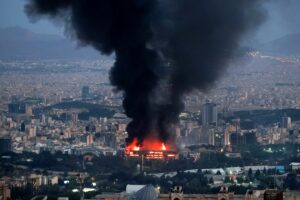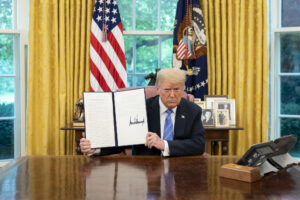With two worlds facing each other, it looks like the Cold War, but it is much more worrying than the Cold War was. On one side, Europe, the United States, New Zealand, Australia, South Korea and Japan: the Democracies, on the other, China, Russia and whole swathes of Asia, Africa and Latin America – all that part of the world (the “Global South”, as it is so falsely called) that sees the time as ripe to take historic revenge by hastening the end of five centuries of Western hegemony.
The war in Ukraine drew this dividing line, and the drama that Hamas unleashed with its massacre on 7 October straight away confirmed its trail. Those who do not want Russia to be defeated in Ukraine because they fear losing a major partner do not want Hamas to be broken up either, because that would indirectly be a victory for the West over Iran, the Arab world and Russia.
Two camps are clearly battling out, but the big difference with the East-West confrontation is that it is no longer a question of ideology but of power rivalries, and neither side has a champion any more, because there are no longer any masters of the game, neither incontestable nor uncontested. Capitalism has triumphed everywhere. It is the dominant ideology, and we must now speak of political convergences rather than blocs, since the United States no longer claims to rule the world, not even its allies; since two of the ‘Brics’, India and China, are to Asia what France and Germany were to Europe; since the alliance between Moscow and Beijing disguises an age-old mistrust; and since Europe, having lost faith in American protection, wants to assert itself as an autonomous power.
This century is being born into the double chaos produced by the simultaneous end of the Cold War and Western supremacy. There is no longer any international order, no longer any universally accepted rules, no longer any obvious balance of power, and no longer any balance of terror, because the powers want to regain or maintain their influence and nuclear proliferation is leading to the unthinkable.
So what is to be done?
Many people are beginning to think that the train would already be gone, that Mr Putin is going to think he has a free hand in Ukraine and Mr Xi in Taiwan, in other words that there is nothing more to be done to prevent the epidemic of conflicts from becoming a pandemic, however, there are yet two things to do.
The first is to dispel the mantra of “double standards” by mobilising the United States, the European Union and the Arab countries to bring the Palestinians and Israelis back to the negotiating table and force them to make the compromises necessary for peace. Wishful thinking as long as the cannons are firing, you might say, but no, not at all, because there is no other solution to this war than the two States, the seeds of dialogue must be sown now because they need time to grow and blossom, and it is without delay that the Americans and Europeans must exert pressure on these two peoples by putting the aid they give them in the balance.
The day the West joins with the Arab capitals in imposing a just and lasting peace, the border separating the two worlds will become far less durable and alarming than it is today, and the second thing to do is to multiply support for Ukraine tenfold.
It is an imperative, because the imperial nostalgia of a dictator must not be allowed to prevail over the mobilisation of democracies, respect for international law and the principle of the territorial integrity of states. In this new division of the world, there are some very old scores to settle. Some of them are no more than grudges. Others require profound changes. In particular, it will be necessary to break with the imbalances of a global governance system that is now out of touch with reality, but a new international order cannot be rooted in a victory of obscurantism over enlightenment, arbitrariness over law and tyranny over freedom.



